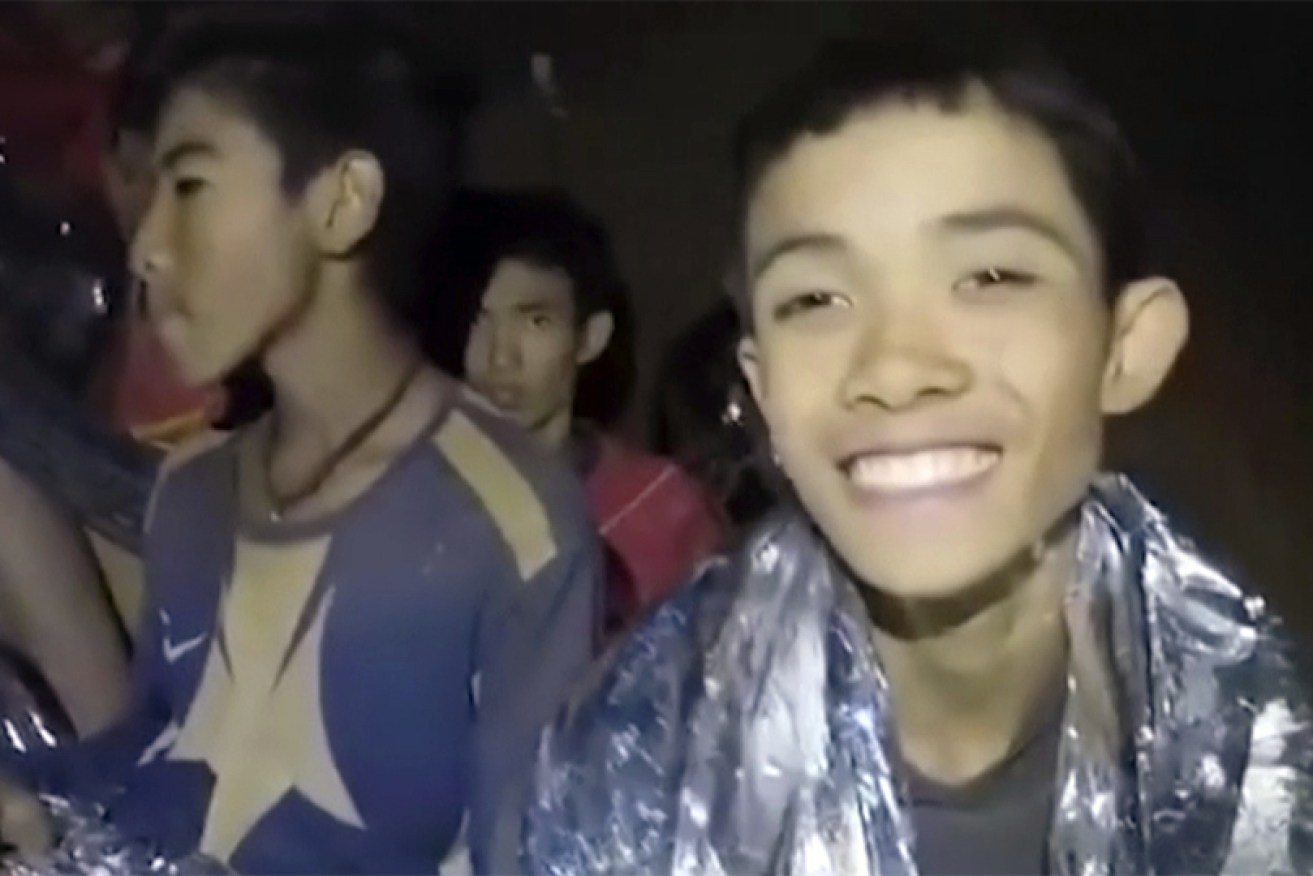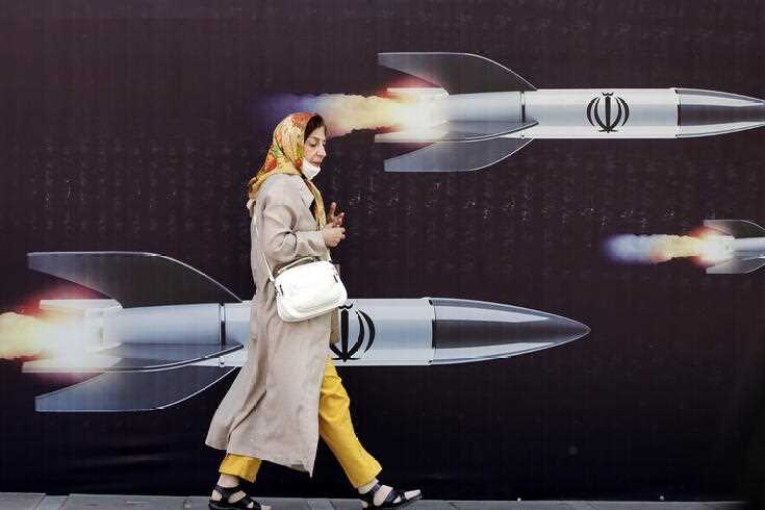How one Wild Boar helped save his mates

Adul smiles as he talks in English with rescue divers. Photo: Thai Navy
Adul Sam-on, 14, has never been a stranger to peril. At age 6, Adul had already escaped a territory in Myanmar known for guerrilla warfare, opium cultivation and methamphetamine trafficking.
His parents slipped him into Thailand, in the hopes that proper schooling would provide him with a better life than that of his illiterate, impoverished family.
But his greatest escape came on Tuesday, when he and 11 other members of the Wild Boars soccer team, along with their coach, were all finally freed from the Tham Luang Cave in northern Thailand, after an ordeal stretching nearly three weeks.
The operation to save the boys and their coach captivated the world.
Members of the Thai navy SEALs and foreign divers squeezed through miles of tunnels, risking their lives to find and carry the young players through an underwater matrix that daunted the British specialists brought in to help. The leader of the operation called it “an impossible mission”.
The only boy that was able to communicate with the British divers when the group was discovered was Burmese born Adul Sam-on. He speaks several languages and is stateless.#Thamluangcaverescue #thaicaverescue pic.twitter.com/eZLncSkpU4
— ThaiMythbuster (@thaimythbuster) July 10, 2018
For 10 days, Adul and his fellow Wild Boars survived deep in the cave complex as their food, flashlights and drinking water diminished. By the time British divers found them on July 2, the Wild Boars and their coach looked skeletal.
It was Adul, the stateless descendant of a Wa ethnic tribal branch once known for headhunting, who played a critical role in the rescue, acting as interpreter for the British divers.
Proficient in English, Thai, Burmese, Mandarin and Wa, Adul politely communicated to the British divers his squad’s greatest needs: food and clarity on just how long they had stayed alive.
When a teammate piped up in broken English, “eat, eat, eat,” Adul said he had already covered that point. In images released by the Thai navy SEALs, he had a huge grin on his gaunt face.
On Tuesday, the border town of Mae Sai, where Adul lived at a church, finally had cause to celebrate, as the Wild Boars’ 18-day ordeal came to an end.
In a three-day rescue mission, Adul and 12 others were safely extracted from the cave by a team of dozens of divers, doctors and support staff.
The extraordinary rescue of the youth soccer squad has been a rare cause for cheer in a nation that has endured four years of military governance and a growing rural-urban divide.
Mae Sai, where the Wild Boars play soccer, seems an unlikely place for a resurgence in Thai pride. Located not far from where Thailand, Myanmar and Laos meet in the Golden Triangle, Mae Sai is home to a population that has at times been skeptical of the Thai state and its institutions.
The Golden Triangle is a smuggling centre, and a sanctuary for members of ethnic militias that have spent decades pushing for autonomy from a government in Myanmar that routinely represses them.
Three of the trapped soccer players, as well as their coach, Ekapol Chanthawong, are stateless ethnic minorities, accustomed to slipping across the border to Myanmar one day and returning for a soccer game in Thailand the next.
Their presence undercuts a Thai sense of nationhood that is girded by a triumvirate of institutions: the military, the monarchy and the Buddhist monastery.
After years of reputational decline because of an army coup in 2014, Thailand’s military has been handed an opportunity to burnish its image.
Thai navy SEAL divers became the faces of the rescue operation. And a retired Thai SEAL diver, Saman Gunan, 38, died during the effort to bring air tanks into the cave to aid in the rescue. On Monday night, Prime Minister Prayuth Chan-ocha, the nation’s junta chief, made his second visit to the cave site.
“The military will score some points here,” said Rangsiman Rome, a student leader who has called for a restoration to democracy in Thailand, even as the military has repeatedly delayed elections and extended its rule. “They get the credit in this mission.”
Thailand’s monarchy has also been buoyed by the outpouring of support for the 13 members of the trapped team.
King Maha Vajiralongkorn Bodindradebayavarangkun, who ascended to the throne in 2016, has engaged with the public more intensely during the caving crisis than at any time during his brief reign.
With the English Adul used to communicate with the British divers on July 2, he was crucial in ensuring the safety of the Wild Boars. He is the top student in his class at the Ban Wiang Phan School in Mae Sai. His academic record and sporting prowess have earned him free tuition and daily lunch.
After crossing into Thailand eight years ago, Adul’s parents dropped him off at a Baptist church in Mae Sai, asking that the pastor and his wife care for him. A quality education was not available in Myanmar’s self-governing Wa region, where young boys can be in danger of getting dragooned into the local guerrilla force.

A sign at the boys’ school. Photo: Twitter/Christoph Sator
At the Ban Wiang Phan School, where 20 per cent of students are stateless and half are ethnic minorities, the principal, Punnawit Thepsurin, said the boy’s uncertain status – he has no citizenship papers from any country – has helped hone his strength.
“Stateless children have a fighting spirit that makes them want to excel,” he said. “Adul is the best of the best.”
While a sign outside the Tham Luang Cave warns that monsoon downpours can transform internal passageways into powerful rivers within a few hours, the boys had explored its caverns before. A forecast of rain on June 23 did not dissuade them.
“They are at an age when they want to explore and learn new things,” said Nopparat Khanthawong, the team’s head coach, who did not join the expedition. “It’s natural for them to go to the cave.”
–The New York Times








